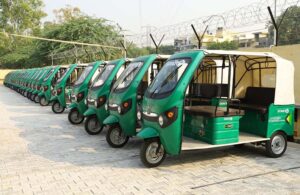Murugappa Group’s subsidiary, Tube Investments of India Limited (TII) will be rolling out its first electric 3-wheeler in March and will start ramping up from April this year.
 Its upcoming EV trucks are also expected to follow the same timelines, said the company’s senior official.
Its upcoming EV trucks are also expected to follow the same timelines, said the company’s senior official.
During recent post-earnings calls, Vellayan Subbiah, executive vice chairman, TII said that the EV three-wheeler, we did have the marketing launch for it. We will start manufacturing and put out the first set of products in March with our current plan and then start selling, increasing volumes from April onwards. On the EV truck, the 55-ton truck will follow a similar timeline.
The EV tractor is something that will still need a full homologation. So that timeline, the company is estimating that it will get homologated in the March-April time frame, which means that sales will only happen in the July time frame.
“The EV tractor timeline is a delay from what we had anticipated in the past. So, that is in terms of when we assume the revenue on these three products will start,” said Subbiah.
K.K. Paul, managing director, TI Clean Mobility PVt Ltd, added in the first phase, the company is looking at the southern states for the company’s launch for commercial production and supply. Distributors around these areas have been selected.
Currently, the company has about 42 distributors, along with the service center, and by the year-end it plans to be at about 75. The company is going systematically and then going state-by-state,” he said.
“We’ve sent some products to a few of them and this has been tested and they are quite positive about it. We are getting into the final stages because we battled the homologation of one part from the change in the standard that had to be done, which we have obtained. And the last part is what we are obtaining, in February, we hope to get that. And so in March, we should be full-scale supplying the plans that we have made. While selecting the dealers also, we have been very careful in working out the ROI carefully so that there is — based on the volumes that we estimated so that we could sufficiently fit them are motivated,” said Paul.
The company’s management further stated there have been two standards on the battery that have been announced by the Government, MORTH (Ministry of Road Transport and Highways), which the company had to comply with. And therefore, that entailed doing, revising the specifications on the batteries and adhering to those safety standards, which are the new ones that they are regulated. And that’s what has been one of the reasons where the company had to raise on, for example, there was a CAN-enabled charge there and much other stuff that they mandated, which resulted in the delays of the launch.
The implementation of CAN protocol enables the Battery management system to communicate with the battery charger.
The company also took that opportunity to do far more reliability tests further to just ensure ourselves. So, these are the two reasons. The other one was also the ramping-up of the supplier volume and aligning them with the quality and delivery standards and having everything up to date to be — for them to be capable of ready just-in-time supply. So, this combination of factors actually resulted in this delay in the launch. “And now going forward, as we already mentioned, in March, we should see the first vehicles rolling out for sales,” said the management.
They further stated, three-wheelers are sufficiently indigenized, excepting for cells, which they need to import, not only them, everybody else. The battery is assembled here. The motor and controller are local. There is nothing to import there.
“There is an internal plan that we are monitoring. And the way we look at it in the first half of next year, there will be a substantial reduction in cost and also in terms of the lead time for supplies because it will get indigenized in terms, that’s the way we are working around this,” said the management.

